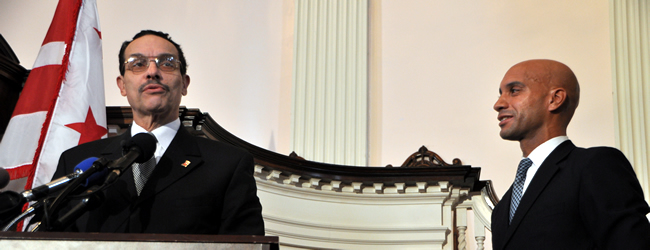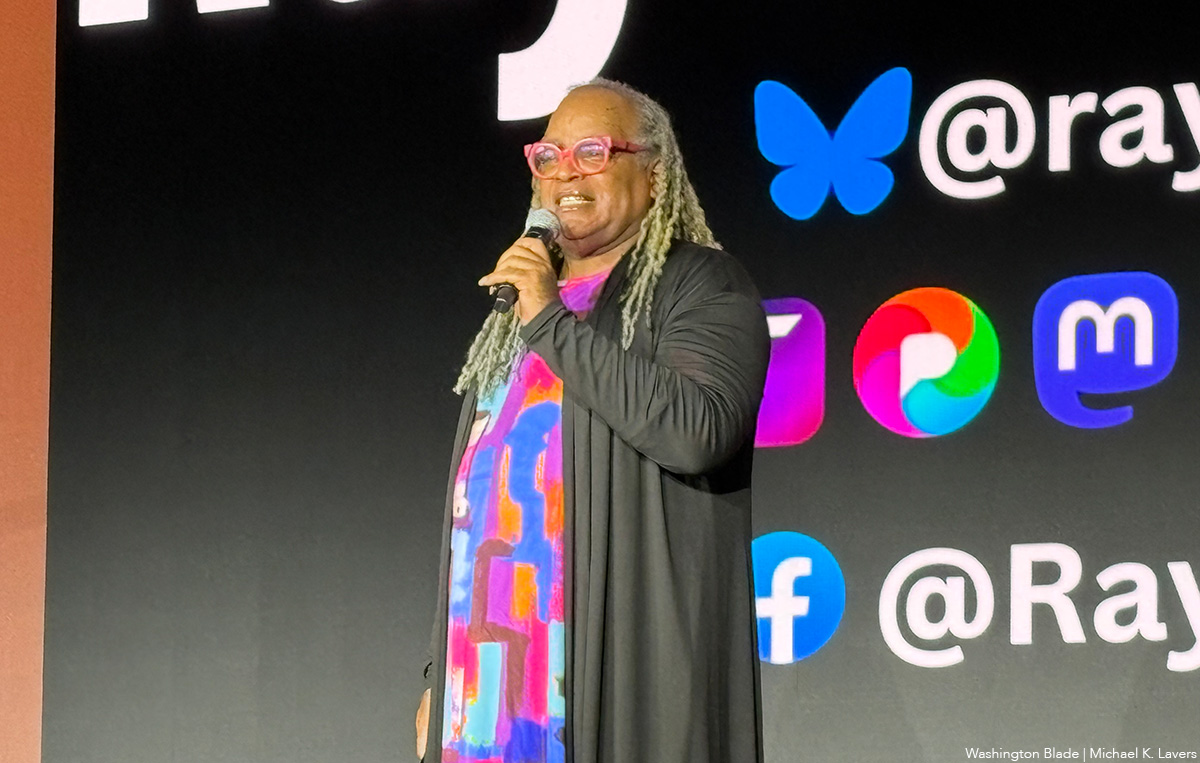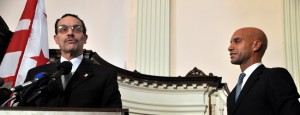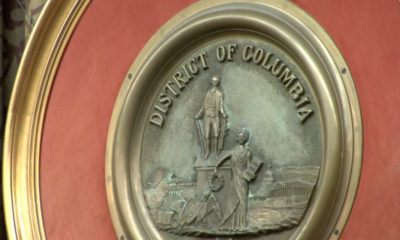Local
Fenty beat Gray in gay precincts
But visible LGBT enclaves are mostly in white neighborhoods

Editor’s note: Go here to see a breakdown of votes in the gayest neighborhoods. Our chart does not include the last of the 15 LGBT precincts we analyzed for this story — Precinct 23, which includes parts of Columbia Heights and the U Street, N.W. corridor. In that precinct, Fenty received 443 votes (57 percent) and Gray received 332 votes (42 percent).
Election returns for the city’s Sept. 14 Democratic primary show that Mayor Adrian Fenty won in 12 of the 15 electoral precincts believed to have high concentrations of LGBT residents, even though many LGBT activist leaders backed City Council Chair Vincent Gray for mayor.
Gray won the primary with a citywide vote of 54 percent to 44 percent, making him the strong favorite to win the November general election in a city where registered Democrats outnumber Republicans by a margin of nearly nine to one.
LGBT-supportive D.C. Council member Phil Mendelson (D-At-Large) also beat gay challenger Clark Ray, the city’s former parks and recreation director, by lopsided margins in all 15 of the gay-oriented precincts. Ray came in third behind Michael D. Brown, the city’s shadow senator, in all but one of the 15 LGBT precincts.
Many LGBT activists following the election said Ray was an attractive candidate but they saw no reason for backing him over Mendelson, who is one of the Council’s strongest supporters on LGBT issues.
While the visible “gay” precincts went for Fenty by wide margins, nearly all of those precincts are in majority white neighborhoods, suggesting that the LGBT vote could have split along the same racial lines as the city vote as a whole in the mayoral race.
All but one of the 15 precincts believed to have high concentrations of LGBT residents are in majority white Wards 1, 2 and 6, which Fenty won. Majority white Ward 3 also went heavily for Fenty.
Majority black Wards 4, 5, 7, and 8 went for Gray by wide margins.
Both Gray and Fenty have strong records of support on LGBT issues. Gray voted for and Fenty signed the city’s same-sex marriage law.
“The black gays in Washington, D.C. tend to be from Washington, D.C. and they live in all parts of the city,” said gay Democratic activist Brad Lewis, who is black. “So I don’t think there’s any one particular precinct that would be the black LGBT precinct,” he said. “I’m at a loss to tell you which one that would be.”
Lewis, a former president of the Gertrude Stein Democratic Club, the city’s largest LGBT political group, joined other activists who hold the view that most black gays voted for Gray.
“I think there were a lot of concerns, especially in the African-American community that their voices weren’t necessarily being listened to by Mayor Fenty,” Lewis said. “I think that transcended sexual orientation.”
Gay Democratic activist Phil Pannell, who also lives in Ward 8 and who backed Gray, has identified Precinct 112 in Ward 8’s Anacostia neighborhood as the one precinct east of the Anacostia River where an identifiable concentration of black gays live. Gray won Precinct 112 by a wide margin.
The precincts selected as areas where high concentrations of LGBT people live include the longstanding gay neighborhoods of Dupont Circle, Adams Morgan, and Logan Circle. They also include areas where large numbers of LGBT people have migrated in recent years such as Columbia Heights, Shaw and the U Street, N.W. corridor that stretches between 9th Street and 17th Street.
Two precincts on Capitol Hill and Precinct 127 in the Southwest D.C. waterfront neighborhood are also included as LGBT-oriented areas.
In addition to winning in Precinct 112 in Anacostia, Gray won Precincts 127 in Southwest and 18 in Shaw, which are believed to have large numbers of black LGBT residents.
Speculation begins on appointments
Gray most likely will name a new director of the city’s Office of GLBT Affairs and ask Police Chief Cathy Lanier to remain in her position, according to sources familiar with Gray.
Gray’s impending decision on whether to retain controversial city schools Chancellor Michelle Rhee has captured the attention of the media and most political insiders.
But to many LGBT activists, Gray’s decision on whether to keep Lanier as chief and his working relationship with her should she stay on will have a critical impact on the status of the department’s Gay & Lesbian Liaison Unit and efforts to combat hate crimes.
During his campaign for mayor, Gray criticized Fenty’s decision to adopt a plan by Lanier to downsize the GLLU’s central headquarters as part of an effort to create a system of affiliate GLLU officers in each of the department’s seven police districts.
“I don’t think it should be an either-or proposition,” Gray told the Blade in an August interview, saying he would prefer to have a fully staffed GLLU headquarters along with affiliate officers.
The local group Gays and Lesbians Opposing Violence has complained that Lanier spurned their longstanding request to retain a fully staffed GLLU headquarters office, which GLOV says is needed to train and coordinate the affiliate officers.
Once source familiar with the Gray campaign said Gray would likely set a policy on how the GLLU should be set up and ask Lanier to follow that policy should he decide to retain Lanier. But one police source said Lanier feels strongly about keeping in place the changes she has made with the GLLU.
The source, who spoke on condition of not being identified, predicted Lanier would resist Gray’s plan to add more officers to the GLLU’s central office, a development that would “test” Gray’s resolve in keeping to his campaign promise to restore the GLLU to a staffing level set by former Police Chief Charles Ramsey under the administration of Mayor Anthony Williams.
Gray has declined to disclose his plans for appointments for all city agencies, saying it would not be appropriate for him to discuss personnel matters until after the November general election.
Most local activists have praised Christopher Dyer, who has served since 2007 as director of the GLBT Affairs Office under Fenty. But sources close to the Gray mayoral campaign, who spoke on condition that they not are identified, said they expect Gray to name his own person to head the GLBT office.
The City Council created the office through legislation introduced by gay Council member Jim Graham (D-Ward 1) during the Williams administration. The legislation also established a mayoral GLBT advisory committee, to which Fenty named Dyer as chair.
Gray has said he strongly supports the GLBT Affairs Office and its advisory panel. During his campaign for mayor he has said the office and advisory panel would play an important role in his administration if he were elected mayor.
Some activists have speculated that Jeffrey Richardson, president of the Gertrude Stein Democratic Club, which endorsed Gray for mayor, and Christopher Fitzgerald, coordinator of Gray Pride, an LGBT committee established under Gray’s mayoral election campaign, would be among the candidates Gray would likely consider to head the LGBT Affairs Office.
Neither Richardson nor Fitzgerald could be reached for comment by press time.
Virginia
McPike wins special election for Va. House of Delegates
Gay Alexandria City Council member becomes 8th LGBTQ member of legislature

Gay Alexandria City Council member Kirk McPike emerged as the decisive winner in a Feb. 10 special election for a seat in the Virginia House of Delegates representing Alexandria.
McPike, a Democrat, received 81.5 percent of the vote in his race against Republican Mason Butler, according to the local publication ALX Now.
He first won election to the Alexandria Council in 2021. He will be filling the House of Delegates seat being vacated by Del. Elizabeth Bennett-Parker (D-Alexandria), who won in another Feb. 10 special election for the Virginia State Senate seat being vacated by gay Sen. Adam Ebbin (D-Alexandria).
Ebbin is resigning from his Senate next week to take a position with Virginia Gov. Abigail Spanberger’s administration.
Upon taking his 5th District seat in the House of Delegate, McPike will become the eighth out LGBTQ member of the Virginia General Assembly. Among those he will be joining is Sen. Danica Roem (D-Manassas), who became the Virginia Legislature’s first transgender member when she won election to the House of Delegates in 2017 before being elected to the Senate in 2023.
“I look forward to continuing to work to address our housing crisis, the challenge of climate change, and the damaging impacts of the Trump administration on the immigrant families, LGBTQ+ Virginians, and federal employees who call Alexandria home,” McPike said in a statement after winning the Democratic nomination for the seat in a special primary held on Jan. 20.
McPike, a longtime LGBTQ rights advocate, has served for the past 13 years as chief of staff for gay U.S. Rep. Mark Takano (D-Calif.) and has remained in that position during his tenure on the Alexandria Council. He said he will resign from that position before taking office in the House of Delegates.
Local
Local LGBTQ groups, activists to commemorate Black History Month
Rayceen Pendarvis to moderate Dupont Underground panel on Sunday

LGBTQ groups in D.C. and elsewhere plan to use Black History Month as an opportunity to commemorate and celebrate Black lives and experiences.
Team Rayceen Productions has no specific events planned, but co-founder Rayceen Pendarvis will attend many functions around D.C. this month.
Pendarvis, a longtime voice in the LGBTQ community in D.C. moderated a panel at Dupont Underground on Feb. 8. The event, “Every (Body) Wants to Be a Showgirl,” will feature art from Black burlesque artists from around the country. Pendarvis on Feb. 23 will attend the showing of multimedia play at the Lincoln Theatre that commemorates the life of James Baldwin.
Equality Virginia plans to prioritize Black voices through a weekly online series, and community-based story telling. The online digital series will center Black LGBTQ voices, specifically trailblazers and activists, and contemporary Black queer and transgender people.
Narissa Rahaman, Equality Virginia’s executive director, stressed the importance of the Black queer community to the overall Pride movement, and said “Equality Virginia is proud to center those voices in our work this month and beyond.”
The Capital Pride Alliance, which hosts Pride events in D.C., has an alliance with the Center for Black Equity, which brings Black Pride to D.C. over Memorial Day weekend. The National LGBTQ Task Force has no specific Black History Month events planned, but plans to participate in online collaborations.
Cathy Renna, the Task Force’s director of communications, told the Washington Blade the organization remains committed to uplifting Black voices. “Our priority is keeping this at the forefront everyday,” she said.
The D.C. LGBTQ+ Community Center is also hosting a series of Black History Month events.
The D.C. Public Library earlier this year launched “Freedom and Resistance,” an exhibition that celebrates Black History Month and Martin Luther King Jr. It will remain on display until the middle of March at the Martin Luther King Jr. Memorial Library at 901 G St., N.W.
District of Columbia
U.S. Attorney’s Office drops hate crime charge in anti-gay assault
Case remains under investigation and ‘further charges’ could come

D.C. police announced on Feb. 9 that they had arrested two days earlier on Feb. 7 a Germantown, Md., man on a charge of simple assault with a hate crime designation after the man allegedly assaulted a gay man at 14th and Q Streets, N.W., while using “homophobic slurs.”
But D.C. Superior Court records show that prosecutors with the Office of the U.S. Attorney for D.C., which prosecutes D.C. violent crime cases, charged the arrested man only with simple assault without a hate crime designation.
In response to a request by the Washington Blade for the reason why the hate crime designation was dropped, a spokesperson for the U.S. Attorney’s office provided this response: “We continue to investigate this matter and make no mistake: should the evidence call for further charges, we will not hesitate to charge them.”
In a statement announcing the arrest in this case, D.C. police stated, “On Saturday, February 7, 2026, at approximately 7:45 p.m. the victim and suspect were in the 1500 block of 14th Street, Northwest. The suspect requested a ‘high five’ from the victim. The victim declined and continued walking,” the statement says.
“The suspect assaulted the victim and used homophobic slurs,” the police statement continues. “The suspect was apprehended by responding officers.”
It adds that 26-year-old Dean Edmundson of Germantown, Md. “was arrested and charged with Simple Assault (Hate/Bias).” The statement also adds, “A designation as a hate crime by MPD does not mean that prosecutors will prosecute it as a hate crime.”
Under D.C.’s Bias Related Crime Act of 1989, penalties for crimes motivated by prejudice against individuals based on race, religion, sexual orientation, gender identity, disability, and homelessness can be enhanced by a court upon conviction by one and a half times greater than the penalty of the underlying crime.
Prosecutors in the past both in D.C. and other states have said they sometimes decide not to include a hate crime designation in assault cases if they don’t think the evidence is sufficient to obtain a conviction by a jury. In some instances, prosecutors have said they were concerned that a skeptical jury might decide to find a defendant not guilty of the underlying assault charge if they did not believe a motive of hate was involved.
A more detailed arrest affidavit filed by D.C. police in Superior Court appears to support the charge of a hate crime designation.
“The victim stated that they refused to High-Five Defendant Edmondson, which, upon that happening, Defendant Edmondson started walking behind both the victim and witness, calling the victim, “bald, ugly, and gay,” the arrest affidavit states.
“The victim stated that upon being called that, Defendant Edmundson pushed the victim with both hands, shoving them, causing the victim to feel the force of the push,” the affidavit continues. “The victim stated that they felt offended and that they were also gay,” it says.
-

 Virginia4 days ago
Virginia4 days agoMcPike wins special election for Va. House of Delegates
-

 a&e features5 days ago
a&e features5 days agoMeet D.C.’s Most Eligible Queer Singles
-

 Congress5 days ago
Congress5 days agoTop Democrats re-introduce trans bill of rights
-

 District of Columbia5 days ago
District of Columbia5 days agoU.S. Attorney’s Office drops hate crime charge in anti-gay assault





















